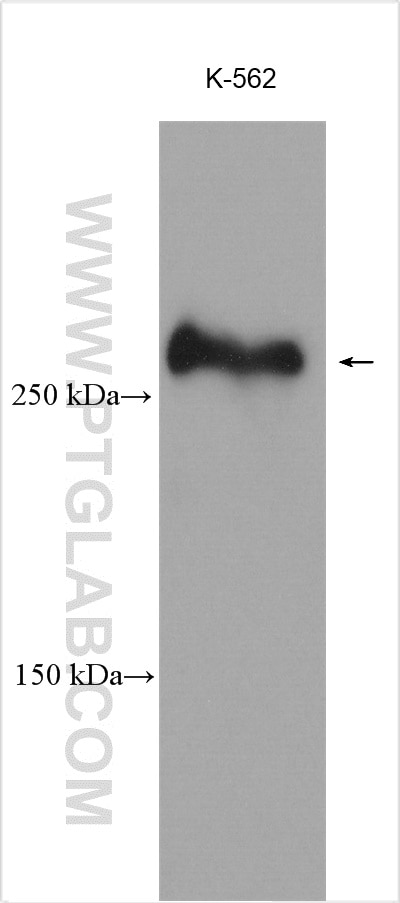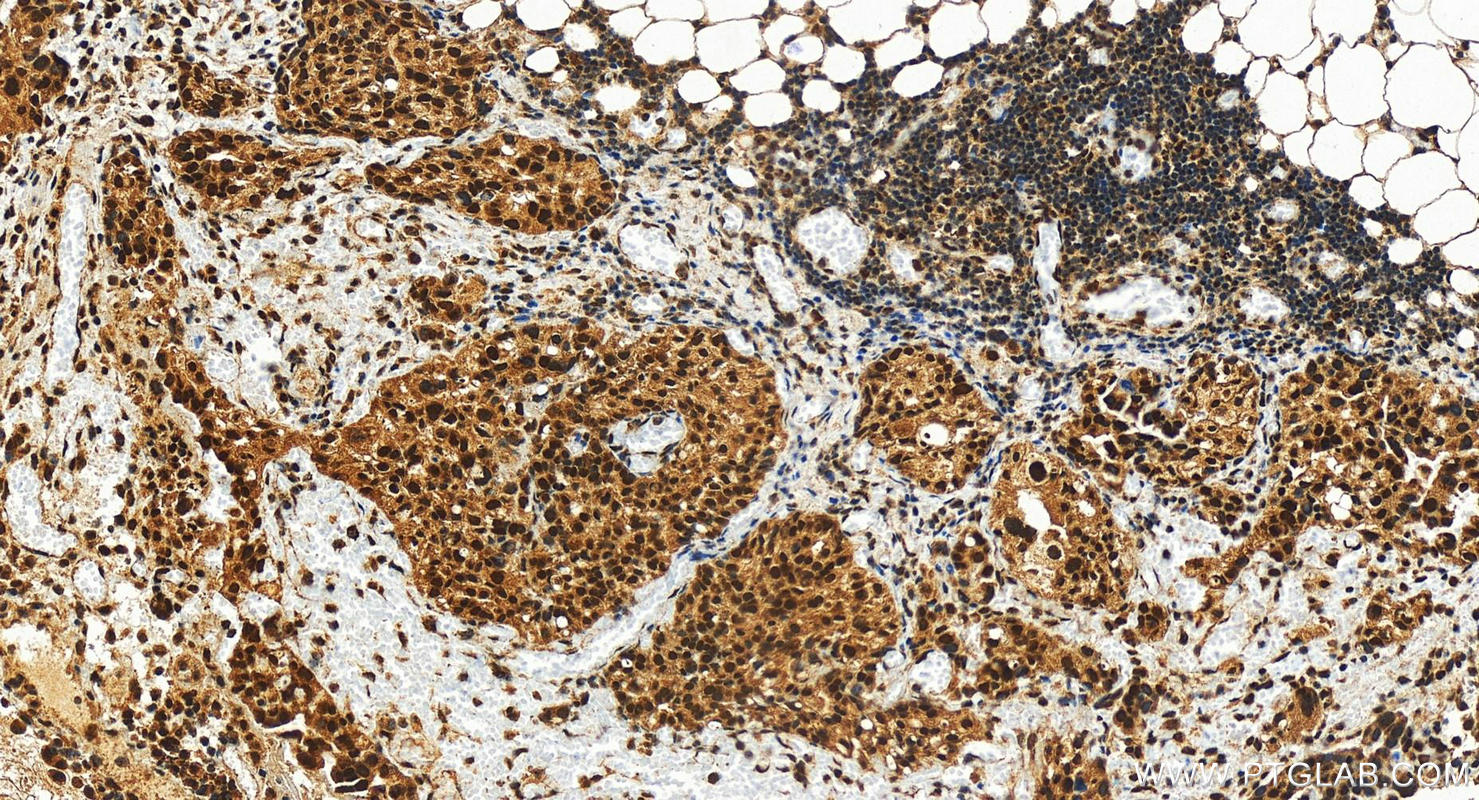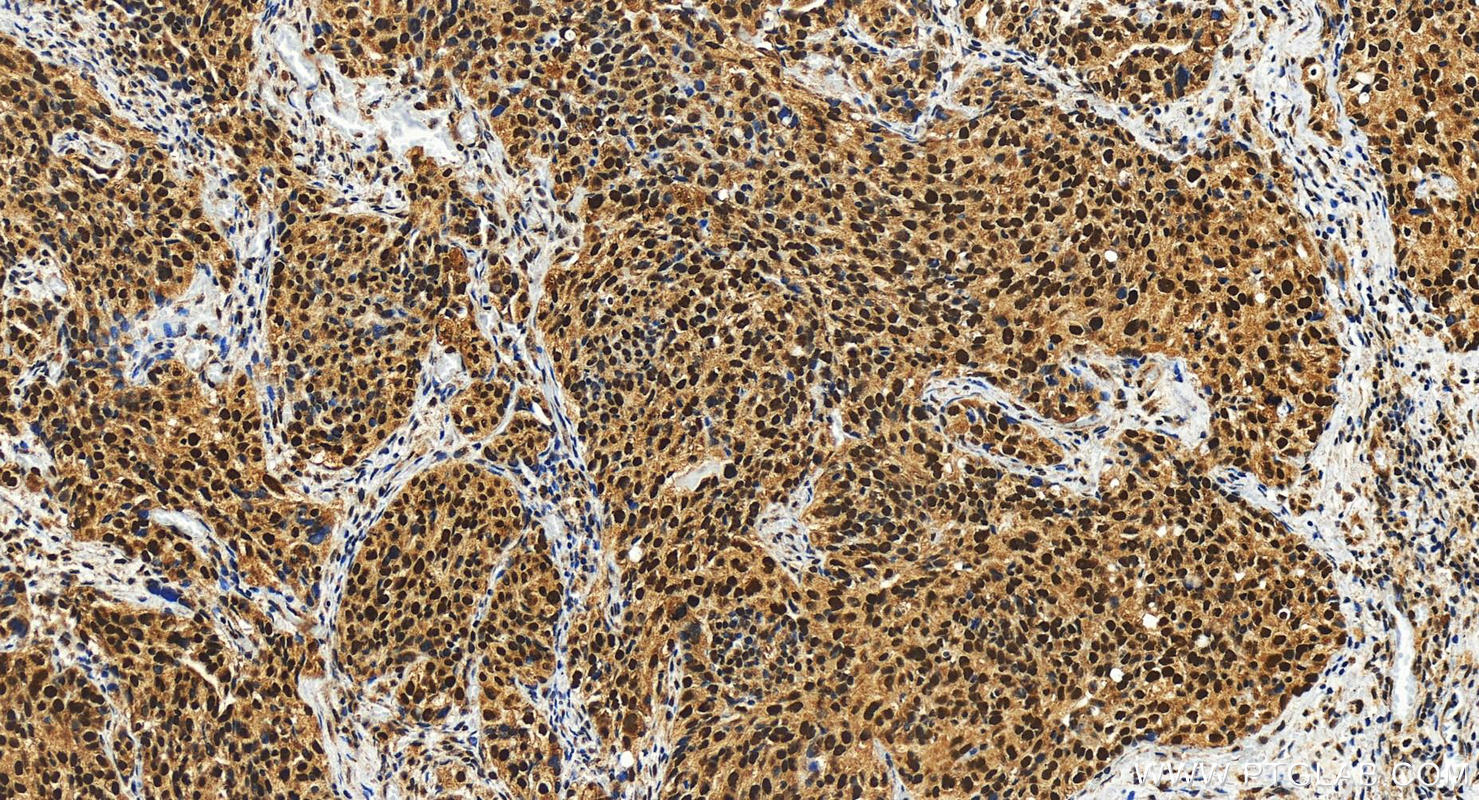Tested Applications
| Positive WB detected in | K-562 cells |
| Positive IHC detected in | human ovary cancer tissue Note: suggested antigen retrieval with TE buffer pH 9.0; (*) Alternatively, antigen retrieval may be performed with citrate buffer pH 6.0 |
Recommended dilution
| Application | Dilution |
|---|---|
| Western Blot (WB) | WB : 1:500-1:1000 |
| Immunohistochemistry (IHC) | IHC : 1:200-1:800 |
| It is recommended that this reagent should be titrated in each testing system to obtain optimal results. | |
| Sample-dependent, Check data in validation data gallery. | |
Published Applications
| WB | See 3 publications below |
| IF | See 1 publications below |
| CoIP | See 1 publications below |
| ChIP | See 1 publications below |
Product Information
28437-1-AP targets KMT2C in WB, IHC, IF, CoIP, ChIP, ELISA applications and shows reactivity with human samples.
| Tested Reactivity | human |
| Cited Reactivity | human |
| Host / Isotype | Rabbit / IgG |
| Class | Polyclonal |
| Type | Antibody |
| Immunogen |
CatNo: Ag28875 Product name: Recombinant human KMT2C protein Source: e coli.-derived, PGEX-4T Tag: GST Domain: 2771-3000 aa of NM_170606 Sequence: SMFNEELDLPIDDKLDNQCVSVEPKKKEQENKTLVLSDKHSPQKKSTVTNEVKTEVLSPNSKVESKCETEKNDENKDNVDTPCSQASAHSDLNDGEKTSLHPCDPDLFEKRTNRETAGPSANVIQASTQLPAQDVINSCGITGSTPVLSSLLANEKSDNSDIRPSGSPPPPTLPASPSNHVSSLPPFIAPPGRVLDNAMNSNVTVVSRVNHVFSQGVQVNPGLIPGQSTV Predict reactive species |
| Full Name | myeloid/lymphoid or mixed-lineage leukemia 3 |
| Calculated Molecular Weight | 541 kDa |
| Observed Molecular Weight | 541kDa, 269 kDa |
| GenBank Accession Number | NM_170606 |
| Gene Symbol | KMT2C |
| Gene ID (NCBI) | 58508 |
| RRID | AB_2918165 |
| Conjugate | Unconjugated |
| Form | Liquid |
| Purification Method | Antigen affinity purification |
| UNIPROT ID | Q8NEZ4 |
| Storage Buffer | PBS with 0.02% sodium azide and 50% glycerol, pH 7.3. |
| Storage Conditions | Store at -20°C. Stable for one year after shipment. Aliquoting is unnecessary for -20oC storage. 20ul sizes contain 0.1% BSA. |
Background Information
Lysine (K)-specific methyltransferase 2C (KMT2C, also known as MLL3) belongs to the mixed-lineage leukemia (MLL) family of histone methyltransferases which methylate the histone 3 tail at lysine 4 (H3K4) as part of the complex proteins associated with Set 1 (COMPASS) complex. Although originally identified as oncogenic fusions in leukemia, genome-wide mutation studies have revealed frequent, presumably loss-of-function, mutations in various members of the MLL family, including MLL2/KMT2B, MLL3/KMT2C, and MLL4/KMT2D in a variety of malignancies, particularly solid tumors. Mechanistic studies of KMT2C in normal cells have focused primarily on its role in enhancer regulation by deposition of H3K4me1 marks.
Protocols
| Product Specific Protocols | |
|---|---|
| IHC protocol for KMT2C antibody 28437-1-AP | Download protocol |
| WB protocol for KMT2C antibody 28437-1-AP | Download protocol |
| Standard Protocols | |
|---|---|
| Click here to view our Standard Protocols |
Publications
| Species | Application | Title |
|---|---|---|
Int Immunopharmacol Polysaccharides from Platycodonis Radix ameliorated respiratory syncytial virus-induced epithelial cell apoptosis and inflammation through activation of miR-181a-mediated Hippo and SIRT1 pathways. | ||
BMC Med Genomics Clinical characteristics and genetic analysis of four pediatric patients with Kleefstra syndrome | ||
Adv Sci (Weinh) TAOK3 Facilitates Esophageal Squamous Cell Carcinoma Progression and Cisplatin Resistance Through Augmenting Autophagy Mediated by IRGM | ||
J Biol Chem TRIM28 represses renal cell carcinoma cell proliferation by inhibiting TFE3/KDM6A-regulated autophagy | ||
Nat Chem Biol UFL1 triggers replication fork degradation by MRE11 in BRCA1/2-deficient cells |








